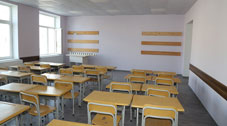
UNICEF says closing schools leaves 50,000 children in Georgia without access to education
By Khatia Bzhalava
Tuesday, February 2
UNICEF Georgia welcomes the government’s decision to re-open schools gradually. According to the statement published by UNICEF Georgia yesterday, the safe opening of schools and pre-schools should be a priority when lifting COVID-related restrictions in the country.
UNICEF notes in the statement that the closure of schools has had a negative impact on children around the world. Their health, development, safety, and well-being are at risk. Children with disabilities and those from families in poverty are under the increased risk of being left behind. UNICEF points out physical and mental problems faced by children left without daily interaction with peers; they show loss of physical fitness and mental distress. UNICEF believes that closing schools should be an extreme measure, after considering every other alternativee as “without the safety net that school often provides, they (children) are more vulnerable to abuse, child marriage, and child labor.”
The statement reads that where there are high levels of community transmission, where health systems are under extreme pressure and closing schools is inevitable, protecting measures must be taken. The measures should ensure that children at risk of violence in their homes, or those reliant upon school meals, whose parents are front-line workers are able to continue their education in classrooms.
Per the government’s decision, the educational process has been resumed in the classrooms in Georgia, however, the lifting of restriction does not apply to Tbilisi, Kutaisi, and Rustavi. In this regard, UNICEF notes that Children in several big cities who are still affected by the closure of schools are forced to rely on virtual learning. As the statement reads, now that digital learning has become a major means of accessing education, unequal access to the Internet is further deepening existing inequalities.
“The closing of schools leaves more than 50,000 children in Georgia with no access to education. It is crucial that catch-up classes are provided to ensure that children, who have been unable to learn remotely are not left behind,” UNICEF notes.
UNICEF calls on the government to prioritize the vaccination of teachers once medical personnel and high-risk populations receive the Covid-19 vaccine. UNICEF believes that this approach will help protect teachers from the virus, and will allow them to teach in person, and ultimately keep schools open.


